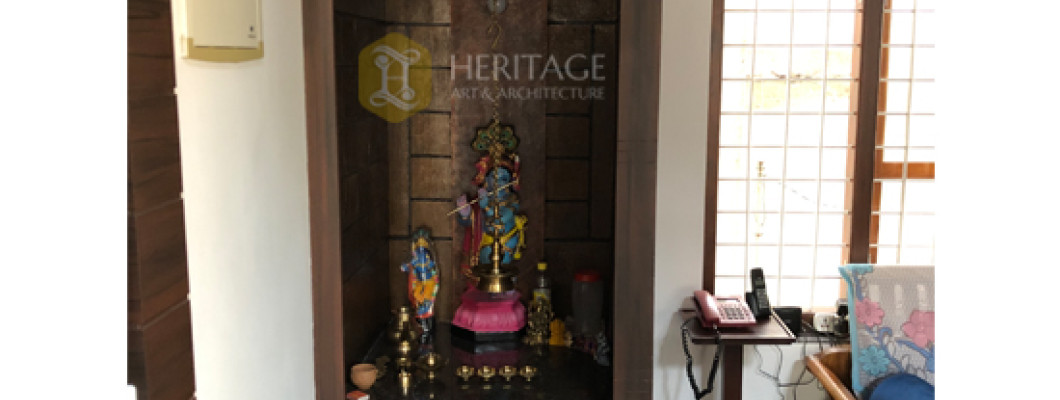
Home is our place of joy and belonging - a unique area where we can connect with ourselves more profoundly than anywhere else. Designating a specific location at your home for meditation and prayer creates a space where you can connect with your soul and spirituality. This commitment to one’s self can be fulfilled by dedicating a space within our homes – a Pooja Room. This designated space will allow you to minimize negative energies and to absorb and enjoy positive energy. This blog will explore the importance of Pooja Room and the principles that guide its design, emphasizing the importance of creating a space that radiates spirituality.
Historical Significance of Pooja Room:
The Pooja Room is considered to be the soul of the home. It is the household's spiritual center. All these years, the main area for the prayers and meditation of our ancestors has been the pooja room. They gave importance to the incorporation of such a space for spiritual existence within their homes right from the planning stage itself. The strategic positioning of the room to enhance positive vibes in the overall interior design was given utmost importance.
The significance of this has been handed down to us by our ancestors, embodying the values given to it by the preceding generations. Thus, the incorporation of a Pooja Room within our homes has seamlessly become an integral aspect of our rich traditions and culture.

Design Principles:
Designing of Pooja Room requires thoughtful planning. One should take into account factors such as the pooja room's orientation within the house, the positioning of idols and their directions, the use of materials, as well as one should ensure sufficient lighting and air circulation. These directly influence the pooja mandir's ability to maximize positive energy while minimizing negative energies.
The ancient Indian science, ‘Vaastu Shastra’, offers needed insights into creating such positive pooja rooms. Vastu Shastra translates "the science of architecture". It deals with the design elements such as layout, measurements, arrangement, and spatial geometry. These principles should be applied while opting for constructing a pooja room within the house. As per vastu principles, it has got everything to do with the peace, well-being, and prosperity of the inhabitants.
Pooja Room Vastu
The guiding principle of Vastu Shastra points out that there is a rightful place for everything, within a space, within a home or within this world. The most important principle related to pooja room vastu is its placing and its orientation within our homes.
According to this principle, the pooja room should ideally face Northeast to attract positive energies associated with good fortune, prosperity, and tranquility. The northeast corner, deemed sacred, is particularly recommended for the placement of the pooja room, creating an optimal environment for prayer and spiritual practices.
The most appropriate direction for placing the pooja room is the northeast, followed by the north and east. The west is permissible to some extent. Positioning the pooja room in the south direction must be avoided.
The windows & doors of the pooja room should open towards the north or east directions. When engaging in prayer, one should align with the same direction. The best material for pooja room doors is high-quality wood. As per Vastu guidelines two-shutter doors should be opted for the pooja room.
It is inappropriate to place the pooja room under a staircase or against a bathroom wall. The ground level is considered the ideal location for a pooja room. One should avoid keeping the pooja room in the basement or on upper floors.
Proper Placement of Idols and Elements
The idols need to be placed with a slight gap from the wall and ensure that they are at least six inches above the ground so that proper continues ventilation and incense stick fragrance will envelop them all the time.
Avoid placing the idols facing each other or towards the door to prevent any negative energy flow. Additionally, the idols and paintings should not be chipped or broken, as it is considered inauspicious.
Avoid having any paintings or depictions of violence as well as pictures or portraits of the deceased, in the pooja room.
Lamps should be placed either in the southeast or east side of the pooja room.
HERITAGE ART AND ARCHITECTURE - Customized Wooden Pooja room
Welcome to Heritage Art and Architecture, your destination for premium wooden pooja rooms and other wooden elements essential for a pooja room. We specialize in crafting exquisite customized wooden sacred spaces that seamlessly blend spirituality with elegance.
In today's world, the available living space for individuals may be limited, making it challenging to incorporate a dedicated pooja room. A personalized solution tailored to your needs can address this issue. Heritage Art and Architecture offers custom-designed wooden pooja rooms that can seamlessly match your style and size preferences.
We exclusively use premium woods such as teakwood and rosewood to ensure the build maintains exceptional quality, allowing the sacred space to be treasured for generations to come.
Each piece is a testament to our dedication to providing clients with a truly unique and personalized spiritual sanctuary within the confines of their living spaces.
If you're seeking individual elements such as doors, windows, storage furniture, etc., for your pooja mandir, Heritage Art and Architecture have it all. We specialize in the craftsmanship of premium wooden creations. Our artisans, with generations of expertise in woodworking, can effortlessly create exquisite wooden carvings. Our creations are crafted with precision using the finest quality wood.
Experience the epitome of craftsmanship and spirituality with Heritage Art and Architecture. Elevate your home with our premium wooden pooja rooms and other wooden elements, where every piece is an artistic expression of devotion and master craftsmanship.
At Heritage Art and Architecture, we understand the significance of a pooja room in your home. Our skilled master artisans bring to life your vision, creating exquisite wooden pooja rooms that not only complement your style but also elevate your worship experience at your home.





